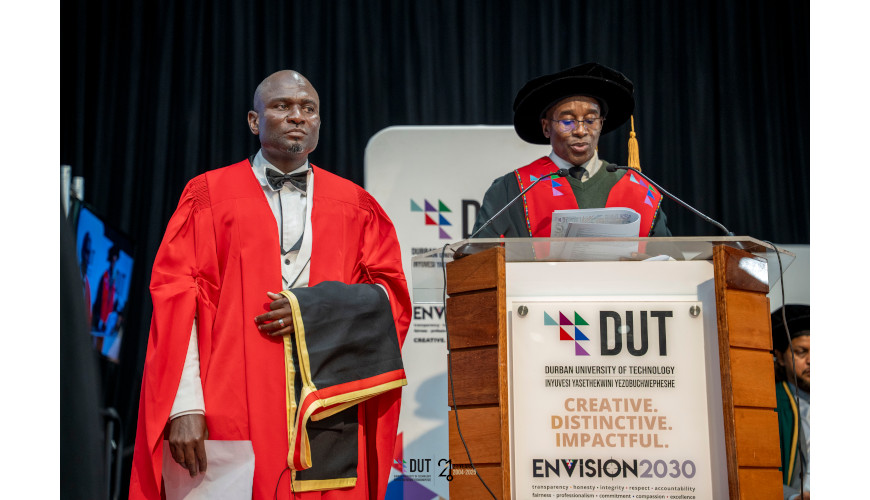“Graduating with a PhD is a monumental milestone in my life. It represents years of dedication, sacrifice, and a relentless pursuit of knowledge. Earning this degree is not just about personal achievement but also about contributing meaningful research to terminology development in African languages such as Sesotho and inspiring others in my community to strive for academic excellence,” said the proud Dr Mape John Mohlomi.
Dr Mohlomi, a lecturer in the Department of African Languages and Literature at the National University of Lesotho was awarded with his Doctor of Philosophy (PhD) in Language Practice at the upcoming DUT 2025 Spring Graduation ceremony, held at the Olive Convention Centre on Friday, 19 September 2025.
The academic resides in Roma, Maseru in Lesotho. He enrolled for the Doctor of Philosophy in Language Practice at the Durban University of Technology (DUT) and has described his PhD journey as both challenging and rewarding. “Throughout my studies, I have grown academically and personally, supported by excellent mentorship and research opportunities that the university provides. The vibrant academic environment has truly shaped my research and critical thinking skills,” he stated.
Dr Mohlomi’s dissertation was titled “An Analysis of Linguistic Terminology Development Strategies and Challenges at the Institution of Higher Learning in Lesotho: The Case of Machobane’s (2010) Thuto-polelo ea Sesotho”, and investigated the development of Sesotho linguistic terminology. His research embraced a qualitative approach and interpretive paradigm, which incorparated Cabré’s Communicative Theory of Terminology (CTT) that analysed 83 excerpts from Machobane’s work.
“Results revealed that strategies such as compounding, lexical borrowing, adoption of previously created terms, loan translation, paraphrasing, semantic expansion, and derivation were used to develop linguistic terminology in Sesotho. Compounding and derivation proved most effective, while paraphrasing and loan translation sometimes created lengthy or complex terminology. Overall, the findings highlight the importance of collaboration between language experts and subject specialists to enhance terminology development and ensure African languages thrive within higher education,” he shared.
He emphasised the challenges that the study exposed, which included difficulties in balancing brevity and transparency in compounded terms, phonological issues in loanwords, semantic ambiguity, and the absence of a national language policy in Lesotho. He added: “The study highlights the importance of collaborative approaches between language experts and subject specialists to improve terminology development and calls for institutional support to enhance the use and development of African languages in higher education.”
Dr Mohlomi used DUT’s core values as a guiding light on his scholarly journey. “I strongly associate with DUT’s value of Excellence because it pushed me to maintain high standards in my research and throughout my academic journey. Additionally, the value of Innovation resonated with me as my research aimed to address real-world problems with creative solutions. Integrity and respect within DUT’s community also played a crucial role in shaping my behaviour as a researcher and professional,” he elaborated.
His journey came with its own set of personal and professional challenges. “Balancing family responsibilities, work commitments, and academic demands was one of my biggest challenges. Additionally, accessing enough resources and navigating administrative processes at times delayed my research progress. However, these challenges taught me resilience and effective time management,” he expressed.
His family responded to his news with sheer support and utter pride. “They celebrated my achievement as a collective victory, acknowledging the hard work and sacrifices it required. Their encouragement was a constant source of motivation throughout my studies,” he remarked warmly.
He shared that pursuing a PhD in Language Practice was completely his own choice and was driven by his passion for language, terminology development and intellectualisation of African languages, with special emphasis on their utilisation as medium of instruction at tertiary level. “I wanted to deepen my knowledge and contribute new insights that could make a positive difference in my community and academia,” he added.
In the near future Dr Mohlomi does not plan to further his studies however, he will continue to learn through workshops, seminars, and professional development opportunities. His plan is to focus his energy on publishing and contributing to academia. “I aim to work in academia and research, contributing to knowledge creation and mentoring future students. Additionally, I hope to collaborate with industry and government to apply research findings practically, influencing policy and development within my field,” he shared.
To first year students venturing into a similar career path, he offered professional guidance: “My advice is to remain disciplined, seek support when needed, and stay curious. Research can be demanding but is incredibly rewarding. Build networks, ask questions, and do not fear failure – it’s part of the learning process. Most importantly, believe in the value of your work,” he said.
Upon reflection of his arduous and rewarding academic experience, Mohlomi expressed his deepest gratitude to his supervisors, colleagues and family for their unwavering support . “DUT has been instrumental in shaping my academic journey, and I encourage prospective students to take full advantage of the resources and opportunities available at the university,” he concluded.
Pictured: Dr Mape John Mohlomi
Haylee Maduray

